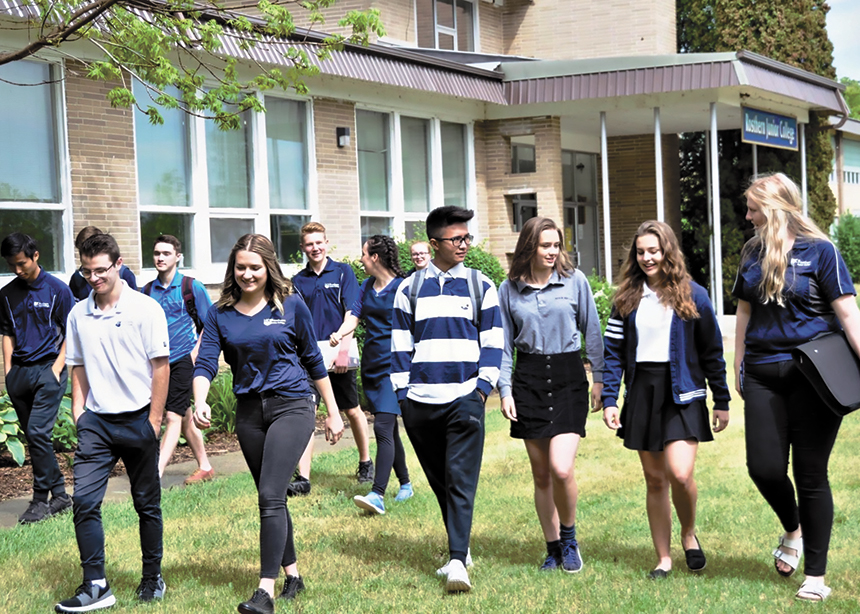Mennonite schools are facing the challenge of operating during a pandemic, both now and into the fall, while staying true to their mission to deliver a faith-based, holistic program.
Ontario
At UMEI Christian High School in Leamington, principal Sonya Bedal praises her “great staff” and their dedication for the way they have “stepped up” to bring programming to students online, saying they have delivered academically “meaningful work” and offered virtual daily chapels as a way to continue faith formation. In planning for September, Bedal anticipates enrolment will decline somewhat from the current 52 students. She is waiting for direction from the provincial ministry of education, expected at the end of June. In the meantime, while prioritizing the safety of staff and students, Bedal is preparing UMEI for several scenarios. These include: returning to school with necessary health and safety protocols in place; a hybrid model where some students return to school while classes are made accessible for others to learn from home; or continuing with online learning for everyone. Students and staff alike miss the sports, music, arts, school trips and other community events that are part of a regular school year. Bedel says it makes them appreciate how much they value “in-person learning,” participation and engagement.
At Rockway Mennonite Collegiate in Kitchener, principal Ann Schultz also feels good about the way staff and students have adapted to online learning. They were “up and running quickly” and able to make “significant refinements” based on feedback from families and teachers. But the school community is feeling the loss of regular events and extra-curricular activities. Looking ahead to September, Rockway has 269 students enrolled, down slightly from the current year. Schultz says that teams are in place to address three areas: how to plan for a safe, healthy facility; maintain academic excellence; and provide care and support for students and staff. She too looks to the education ministry and health professionals to guide decisions, but meanwhile Rockway is investing in technology so that classes can run in the building or at home in a way that is accessible and secure. Schultz says that in the midst of this crisis Rockway is being “forced to re-imagine” many things, which requires agility, but can also be an opportunity. Even as the school staff “adapt and pivot” everything from timetabling to fiscal plans, she says, “we keep the mission in the forefront of all we do,” grateful for the “patience and grace extended to us.”
—By Janet Bauman
Manitoba
Both locations of Winnipeg Mennonite Elementary and Middle Schools—the Bedson campus and Katherine Friesen campus—are busy planning for a full return to in-person classes when the new school year begins, says Lawrence Hamm, the superintendent and chief executive officer. They anticipate being in their regular class sizes, which they cap at slightly smaller numbers than most schools. The campuses, which teach Kindergarten to Grade 8, are expecting 200 students at Bedson and 180 students at Katherine Friesen. The latter will be welcoming its first group of eighth graders this fall. The schools have updated rules on cleaning and have developed new procedures for students when they are in the buildings. They have begun practising them as students have been reintroduced into school this June after a few months of remote learning. “I think that the biggest challenge is to ensure that our children learn from this entire experience and are assured that, regardless of what is happening in the world, they’re going to be okay,” Hamm says. “God is here with us through thick and thin, and if we rely on him and each other through times like this, we’re going to be okay.”
Although projecting a few weeks ahead, never mind a few months, is difficult during the novel coronavirus pandemic, Mennonite Collegiate Institute (MCI), Gretna, intends to return to in-class instruction and reopen its dorms this fall, says Harold Schlegel, the school’s executive director and donor development officer. The school is also planning to welcome back international students, who will have isolated for a period of time upon returning to Canada. MCI is well set up to deal with any physical distancing requirements, with 71 students in grades 9 to 12 enrolled this past year, almost 40 of who lived in dorms. “It actually is a time where our current small size is to our advantage,” Schlegel says. Quick adjustment to distanced online learning this spring by both teachers and students mean they will be prepared should the need for virtual learning arise once again. “We recognize that all of this can change very quickly and that we will need to be adaptable in how we deliver our services,” he says. Determining whether MCI’s choral program, a central pillar of the school, can continue in the fall is the challenge currently weighing heaviest on the school.
“We are ready to go for school in September,” says Bob Hummelt, principal of Westgate Mennonite Collegiate in Winnipeg. The school is preparing for in-person education for all of its students, although, should the conditions require, it is equipped for online instruction after a successful spring of teaching that way. Westgate is waiting for guidelines from the Province of Manitoba that will dictate class sizes and how the athletic and music programs will be able to run. How to operate the cafeteria, and whether the school’s music tour and study tours abroad will be able to run, are also under discussion. With a student body of 325 students in grades 6 to 12 this year, appropriate distancing measures will be established with creativity and much timetabling. Hummelt has hired a half-time staffer, Gabrielle Bishop Wiebe, to work with the music program. The additional support will enable bands and choirs to be split into smaller groups, in the hope that the programs will then be able to continue. In the meantime, Hummelt will be monitoring the phones throughout the summer, to give families interested in Westgate more information and possibly even tours of the campus.
—By Nicolien Klassen-Wiebe
Saskatchewan
Ryan Wood, principal of RJC High School (Rosthern Junior College), says the school is planning to fully re-open with regular classes and full kitchen and dorm service in the fall. However, he adds that the school is working on contingency plans. A hybrid model might include staggered classes and rotating lunch times. In addition, RJC’s dorm rooms are being renovated to allow for single occupancy. “Our plan is to follow all the directives of the Ministry [of Education],” he says, but “we’re still awaiting clear directives.” Saskatchewan is the only province that chose to end the school year in mid-March when the pandemic was declared. Students were encouraged—but not required—to participate in remote learning. Wood says that most RJC students engaged in online classes, although some opted not to participate. If a predicted second wave of COVID-19 forces the school to close again, remote learning may not be optional, as it is now. Wood believes that remote learning will continue on some level even after the pandemic is over. He thinks it could be especially useful in terms of student sick days or if a student’s family goes on vacation. “Teachers’ workloads might [have to] be redefined to include both face-to-face and remote teaching,” says Wood. However, he also feels that there will be “a stronger appetite for face-to-face learning.”
—By Donna Schulz
Alberta
Menno Simons Christian School in Calgary has 200 students from Kindergarten to Grade 9 and is planning to fully re-open on Sept. 2. The Alberta government will not be mandating school openings until sometime in August, at which time the opening date can be officially confirmed. Currently, the school is operating under a hybrid system, with some teachers working from home and other teachers working from the school. Teachers continue to provide classes and connect through Google Classroom, Google Meets and Google Hangouts. If the government decides not to allow schools to physically reopen, classes will continue to occur online. Although students can’t wait to be together and the teachers can’t wait to be with the students, some families are enjoying being more involved in their children’s lives, according to a school official. Online classes will end as scheduled on June 26, and the school is currently taking applications for the new 2020-21 school year. Applications can be found online at mennosimonschristianschool.ca/and virtual school tours are available.
—By Joanne De Jong
British Columbia
Mennonite Educational Institute in Abbotsford could not be reached in time to get a response into this issue.
This article appears in the June 22, 2020 print issue, with the headline ‘Forced to re-imagine.’
Related story:
Fall plans for Mennonite post-secondary schools







Leave a Reply
You must be logged in to post a comment.